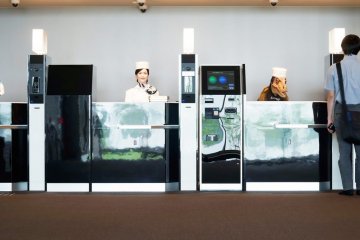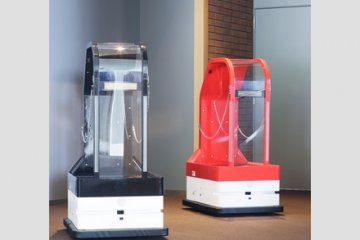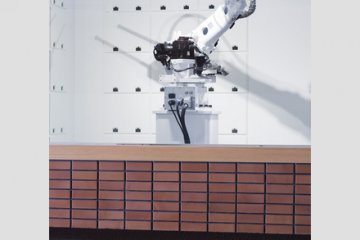If your mind was blown with the Robot Restaurant, get ready for what Japan has in store next to surprise the world — a robot hotel.
Henn-na Hotel, which literally translates to "Strange Hotel" in English, is just what its name suggests. Making its long-anticipated opening on July 17th in Huis Ten Bosch theme park in Sasebo, Nagasaki, it is the first robot-staffed hotel in the world.
With robots serving guests and roughly 70% of all operations fully-automated, Henn-na Hotel's primary aim is to become the most efficient hotel in the world by cutting down on the "Big 3" costs of a hotel — construction, wages, and utilities — while pursuing environmental friendliness (the hotel is powered by solar panels) and offering the comfortable experience of a three- or four-star accommodation, without forgetting the warm Japanese mentality of omotenashi (hospitality) despite not being staffed by humans. The result is that staying at Henn-na Hotel, in addition to costing less than 1/3 of staying in another one of Huis Ten Bosch's accommodations, is now one of the most unique hotels in the world to say the very least.
Three robots, including a dinosaur (!) will greet guests at the front desk; these robots are equipped with voice recognition systems, and accommodates Japanese, English, Korean, and Chinese (only Japanese and English are currently available). The three robots will handle check-in and check-out, along with a touch panel where guests will enter personal information, as well as their preference for either a card key or facial authentication entry. Porter robots will help guests transport luggage to their rooms, while a robotic arm manning the cloak will take and store personal items for guests in lockers (500 yen for 24 hours) before check-in and after check-out. Drinks and light snacks at the cafe will be sold via vending machine, while the concierge will also be a robot. 'Entertainment' robots, on which guests can play games on, are also situated in the lobby.
The only humans will be administrators, janitors, and surveillance monitors, and only play supporting roles, resulting in a mere 13 people maximum necessary to operate the hotel; by staffing the hotel with robots, they can focus more on tasks that cannot be automated, resulting in greater efficiency and better performance.
Guests can choose from three types of rooms: standard, superior, and deluxe. Each room is equipped a robot in the form of Huis Ten Bosch's official mascot, which is also equipped with a voice recognition system and can handle turning lights on and off, give a weather forecast, and setting alarms. Everything else necessary is condensed into a Windows tablet; Skype for Business is installed for making calls (available functions vary according to type of room), while guests can watch TV on it. Wi-Fi is available in all rooms and throughout the hotel. Furthermore, drones are expected to serve guests in the near future as well; although currently still in the trial process, a drone carrying a bag of peanuts to a guest room was shown off during the opening ceremony as part of the hotel's immense potential.
However, in line with Henn-na Hotel's goal to cut costs as much as possible, rooms are not equipped with refrigerators, and only the bare minimum of amenities (shampoo, rinse, body soap, toothbrushes, Q-Tips, hair brushes) are available for use. Moreover, extra amenities (such as towels and pajamas), as well as bed-making and room-cleaning are only available through extra charge (varies according to type of room). Air conditioning is replaced by a cutting-edge "radiant panel" air conditioning system, which still assures visitors a comfortable stay any time of the year.
The Henn-na Hotel in Huis Ten Bosch is actually the "0th hotel" of the franchise; after seeing what works and what doesn't in order to mold the hotel into its best form, the 1st hotel is scheduled to open in Laguna Ten Bosch (located in Gamagori, Aichi), before expanding operations throughout Japan and overseas. An added plus to Henn-na Hotel is that it can adapt to the latest technology very easily; the "hen," while it means "strange" in Japanese, can also have the meaning of "to change."
Seventy-two rooms are currently available, with an additional 72 planned to be completed by February 2016. Reservations can be made via email by accessing the hotel's official website, with rooms going to those offering the highest price (though not a bidding system). Henn-na Hotel is expected to operate at 60-70% capacity in July and 80-90% capacity in August; however, despite not conducting advertising campaigns in order to cut costs (in line with the hotel's main goal), inquiries for reservations have already nearly reached maximum capacity, so be sure to apply as soon as possible!
Only a handful of people can boast that they stayed at the world's first robot-staffed hotel around the time of its opening; why not be one of them?
More Information
Official Website (in English)









